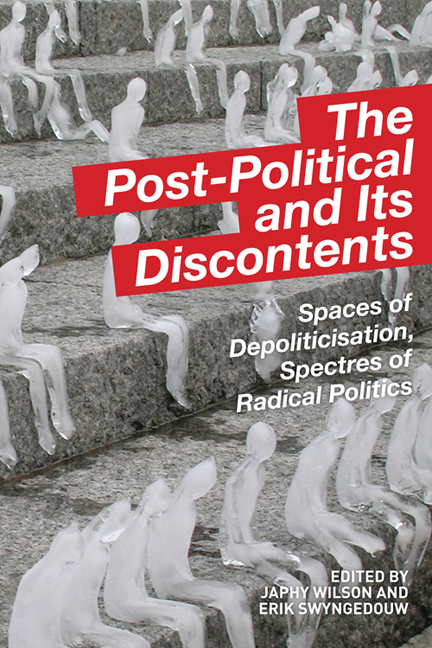Book contents
- Frontmatter
- Contents
- List of Contributors
- Seeds of Dystopia: Post-Politics and the Return of the Political
- Part I Spaces of Depoliticisation
- Part II Spectres of Radical Politics
- 8 Insurgent Architects, Radical Cities and the Promise of the Political
- 9 The Limits of Post-Politics: Rethinking Radical Social Enterprise
- 10 Neither Cosmopolitanism nor Multipolarity: The Political Beyond Global Governmentality
- 11 Against a Speculative Leftism
- 12 Spatialising Politics: Antagonistic Imaginaries of Indignant Squares
- 13 After Post-Politics: Occupation and the Return of Communism
- 14 The Enigma of Revolt: Militant Politics in a ‘Post- Political’ Age
- There Is No Alternative
- Index
14 - The Enigma of Revolt: Militant Politics in a ‘Post- Political’ Age
from Part II - Spectres of Radical Politics
Published online by Cambridge University Press: 05 August 2016
- Frontmatter
- Contents
- List of Contributors
- Seeds of Dystopia: Post-Politics and the Return of the Political
- Part I Spaces of Depoliticisation
- Part II Spectres of Radical Politics
- 8 Insurgent Architects, Radical Cities and the Promise of the Political
- 9 The Limits of Post-Politics: Rethinking Radical Social Enterprise
- 10 Neither Cosmopolitanism nor Multipolarity: The Political Beyond Global Governmentality
- 11 Against a Speculative Leftism
- 12 Spatialising Politics: Antagonistic Imaginaries of Indignant Squares
- 13 After Post-Politics: Occupation and the Return of Communism
- 14 The Enigma of Revolt: Militant Politics in a ‘Post- Political’ Age
- There Is No Alternative
- Index
Summary
Schuwalkin and us
In a remarkable essay on Kafka, written in 1934 on the tenth anniversary of his death, Walter Benjamin introduces Potemkin, Catherine the Great's partner and chancellor. Potemkin is a drunk afflicted by severe and regular fits of depression. In one unusually long low, he retreats to his room, barring everybody entry. But nothing can be done without Potemkin's signature. So official business piles up, policies can't be enacted and grave irregularities result; Russian ministries come to a standstill. Catherine and top civil servants are at their wits’ end. Then, one day, in struts a young, headstrong minor clerk called Schuwalkin. ‘What's up?’ Schuwalkin wonders. The ministers explain. Schuwalkin isn't impressed. Such inactivity and passivity. He's zealous and wants action, now. ‘If that's all it is, gentlemen,’ he replies, ‘give me those files, I beg you’ (Benjamin 2009: 193). The ministers have nothing to lose. So Schuwalkin grabs the bundles of papers and sets off through the galleries, along the corridors, to Potemkin's gloomy bedchamber. In he marches, without knocking, without even saying a word, foisting the documents under the nose of the bedridden chancellor. Dipping his plume in ink, he hands it to the startled Potemkin. Absent-mindedly, sleepily, the latter executes the first signature, then a second, then a third, and eventually all of them. Schuwalkin bolts back to the ministers who bend over the documents.
Not one says a word; the group stands frozen. Once again, Schuwalkin approaches, once again he inquires zealously: what is the reason for the gentlemen's consternation? Then his glance too fell on the signature. Document after document is signed: Schuwalkin, Schuwalkin, Schuwalkin …’ (Benjamin 2009: 194)
This vignette, says Benjamin, strikes us like a messenger, heralding Kafka's work two centuries in advance. The zealous and lighthearted Schuwalkin, like Kafka's K. in The Castle, has a brush with authority, is partly assuaged, yet ultimately comes away frustrated and empty-handed. Those authorities, mysterious and secluded in their bedchambers, in their dark attics within attics, along corridors off corridors, are there, sometimes glimpsed, sometimes even challenged, yet always – or seemingly always – elude us and deflect us: their full panoply of power remains intact come what may.
- Type
- Chapter
- Information
- The Post-Political and Its DiscontentsSpaces of Depoliticisation, Spectres of Radical Politics, pp. 279 - 298Publisher: Edinburgh University PressPrint publication year: 2014



